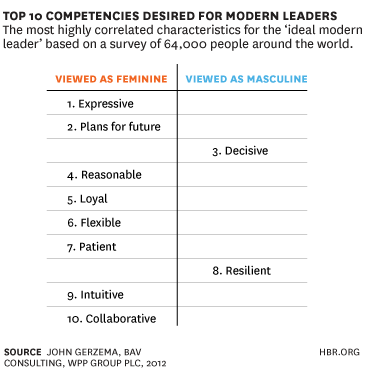I recently read this article from the Harvard Business Review stating that “Feminine” Values Can Give Tomorrow’s Leaders an Edge. A study was done asking 64,000 people from over 13 countries all over the world for the traits, skills and competencies that were perceived to be appreciated in leaders in the world of business and leadership. The conclusions (from statistical modeling) that the analysts came to were that tomorrow’s leaders must overwhelmingly learn to have what our culture has defined to be “feminine” traits. Here’s the list of the survey said were the top 10 desired traits for modern leaders:
I don’t disagree with these traits, honestly, and as a feminist it actually excites me that the values that I work to foster in the classroom are being valued in the boardroom and society in general (Dewey would be proud too). However, something that is troubling me is the ever-popular dichotomy that is being set up here that seems to always be at the heart of many issues that rise in our society. Something I wrote about in my dissertation and any time I talk about Relational Pedagogy is the idea of breaking down this concept of masculine vs. feminine thinking, not only in mathematics or education, but in human relations altogether.
I will be the first person to motivate and encourage young women in the STEM fields or take a young boy who likes cooking and say, “you, go guy” and hand him an apron – but that is about individualism and allowing young people to be who they want to be and feel empowered. In my classroom, allowing students to see multiple perspectives and have their voice heard whether they are male or female is entirely my top priority because they are individuals and their relationship with mathematics is unique. For a long time in math education, the ideas in this study were how young girls were viewed – researchers thought that if we just saw how girls were different from boys that we could see why they weren’t “doing as well” as boys. However, we saw that they were doing just as well.
So my problem with this study is not the fact that women will be empowered to become leaders in business – no, that’s really exciting to me. In fact, maybe some men will see the potential in women and decide to hire more women in the future and this will create more jobs for women and this will in turn, create a more equitable workplace and more favorable working conditions, which will then create more exciting options for business situations because of the fact that different perspectives are being looked at with such different views being taken in problem solving in business. That is extremely exciting to me!
However, my problem with this study is this. In order to make such radical changes in how people view gender differences in our society we really need to stop making such huge oppositional statements. In support of this view, Mendick (2005) stated
By aligning separate-ness with masculinity and connected-ness with femininity, these approaches feed the oppositional binary patterning of our thinking and in the final analysis reiterate it (p 163).
If we just continue to point out how “unfeminine” men are because they are less expressive and how “unmasculine” women because they can be undecisive all we are doing is perpetuating the oppositions that separate us instead of our humanness that can bring us together as learners and our vulnerability that can help us problem solve with our strengths and weaknesses that will make us stronger if we work together.
There was an article published in 2010, about how if you put more women in a group of people the “collective intelligence” increases – the group works better together. I’m sure there’s some tipping point though that if the group has all women there are diminishing returns for this measure. There has to come a time when we value the relationships in our learning, our work and our classrooms and as teachers foster all of these traits to the best of our abilities.
